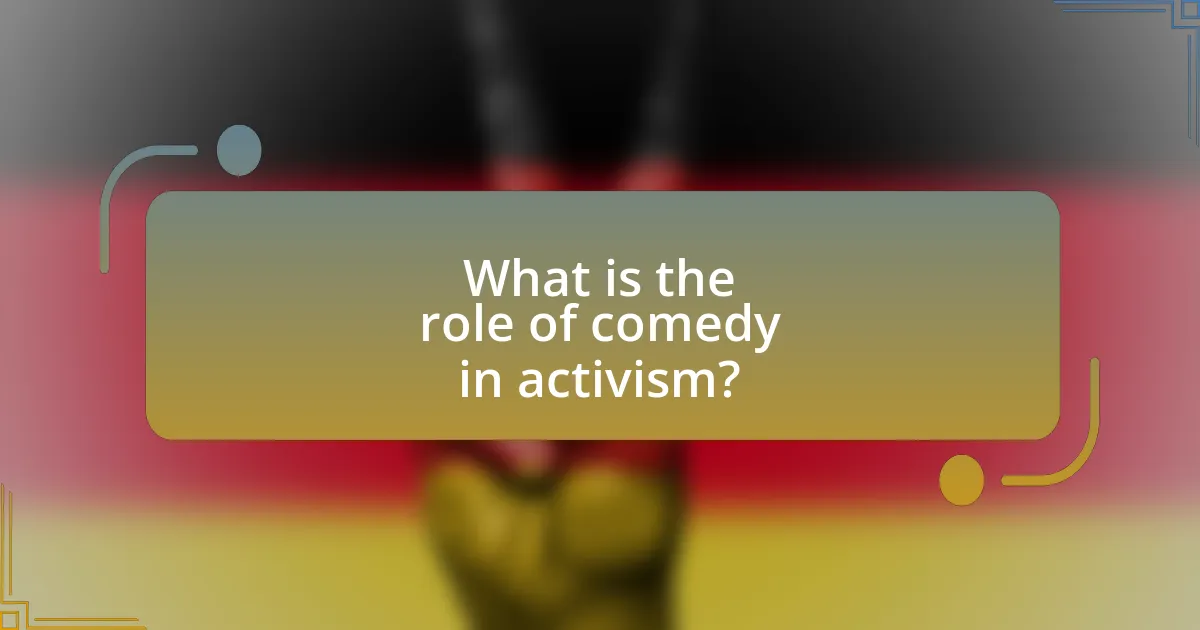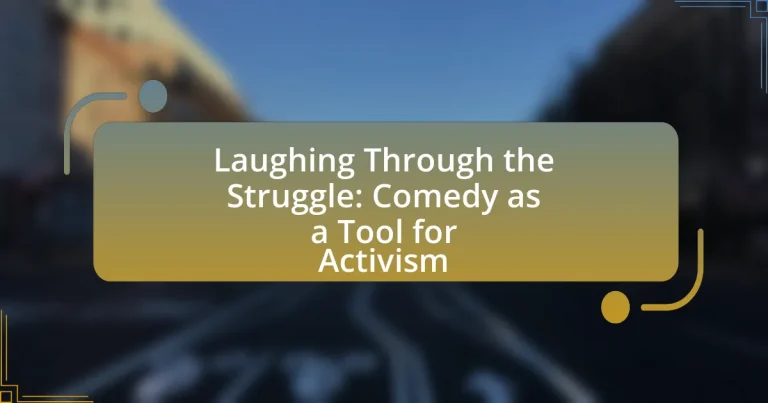The article “Laughing Through the Struggle: Comedy as a Tool for Activism” explores the significant role of comedy in activism, highlighting how humor can effectively address serious social issues and engage audiences. It discusses how comedians like John Oliver and Hasan Minhaj use satire to challenge societal norms and provoke critical thought, making complex topics more relatable. The article also examines historical examples of comedic activism, the psychological effects of laughter on audiences, and the challenges comedians face when addressing sensitive issues. Additionally, it outlines practical strategies for integrating comedy into activist movements and emphasizes the impact of comedic messaging on public perception and social change.

What is the role of comedy in activism?
Comedy plays a crucial role in activism by providing a means to address serious social issues in an engaging and accessible manner. It allows activists to challenge societal norms and provoke thought while entertaining audiences, making difficult topics more relatable. For instance, comedians like John Oliver and Hasan Minhaj use humor to highlight political corruption and social injustices, effectively raising awareness and prompting discussions among viewers. Research indicates that humor can lower defenses and increase receptivity to new ideas, making it a powerful tool for conveying messages and mobilizing support for various causes.
How does comedy serve as a medium for social change?
Comedy serves as a medium for social change by using humor to challenge societal norms and provoke critical thought. Comedians often address sensitive topics such as race, gender, and politics, making complex issues more accessible and relatable to audiences. For instance, shows like “The Daily Show” and “Saturday Night Live” have historically highlighted political injustices and social issues, influencing public opinion and sparking conversations. Research indicates that humor can lower defenses and increase receptivity to new ideas, making it an effective tool for activism. A study published in the journal “Psychological Science” found that humor can enhance persuasive communication, thereby facilitating social change.
What are the historical examples of comedy influencing activism?
Comedy has historically influenced activism through various movements and figures. For instance, the satirical work of Lenny Bruce in the 1960s challenged social norms and censorship, contributing to the fight for free speech and civil rights. Additionally, the comedic performances of Richard Pryor addressed racial issues and police brutality, raising awareness and fostering dialogue during the civil rights movement. Furthermore, the television show “Saturday Night Live” has used political satire to critique government actions and mobilize public opinion, particularly during elections. These examples illustrate how comedy has served as a powerful tool for social change and activism throughout history.
How do comedians address social issues through humor?
Comedians address social issues through humor by using satire, irony, and observational comedy to highlight societal problems and provoke thought. This approach allows them to engage audiences in discussions about sensitive topics, such as race, gender, and politics, in a manner that is more accessible and less confrontational. For instance, comedians like Dave Chappelle and John Oliver often tackle complex issues, making them relatable and digestible through comedic storytelling and punchlines. Research indicates that humor can reduce defensiveness and increase openness to new ideas, making it an effective tool for social commentary and activism.
Why is laughter an effective tool in activism?
Laughter is an effective tool in activism because it fosters connection, reduces tension, and enhances message retention. By using humor, activists can engage audiences more deeply, making serious issues more approachable and relatable. Research indicates that laughter can increase openness to new ideas; for instance, a study published in the journal “Psychological Science” found that humor can enhance persuasion by making messages more enjoyable and memorable. This ability to create a positive emotional response helps to break down barriers, encouraging dialogue and promoting social change.
What psychological effects does laughter have on audiences?
Laughter has significant psychological effects on audiences, primarily enhancing mood and fostering social connections. When audiences laugh, their brains release endorphins, which are chemicals that promote feelings of happiness and reduce stress. This biochemical response not only elevates individual mood but also strengthens group cohesion, as shared laughter creates a sense of belonging and community among audience members. Research indicates that laughter can lower cortisol levels, a hormone associated with stress, thereby contributing to overall psychological well-being. Furthermore, laughter can serve as a coping mechanism, allowing audiences to process difficult topics or social issues in a more approachable manner, ultimately facilitating discussions around activism and social change.
How does humor create a sense of community among activists?
Humor fosters a sense of community among activists by creating shared experiences that enhance bonding and solidarity. When activists use humor, they can address serious issues in a way that is relatable and engaging, which helps to break down barriers and facilitate open communication. For example, comedic performances or satirical content can highlight social injustices while simultaneously providing relief from the emotional weight of activism, making individuals feel less isolated in their struggles. Research indicates that laughter can increase group cohesion and promote a collective identity, as seen in various activist movements where humor has been employed to unify participants and strengthen their resolve.
What challenges do comedians face when using humor for activism?
Comedians face several challenges when using humor for activism, primarily including the risk of misinterpretation and backlash. The nuanced nature of humor can lead audiences to misunderstand the intended message, resulting in offense rather than awareness. Additionally, comedians often navigate the fine line between satire and insensitivity, where jokes about sensitive topics can alienate or harm marginalized groups. Furthermore, societal and cultural contexts can influence how humor is received, making it difficult for comedians to gauge audience reactions accurately. For instance, a study by the University of Southern California found that humor addressing social issues can provoke strong emotional responses, which may not always align with the activist goals of the comedian.
How can humor be misinterpreted in activist contexts?
Humor can be misinterpreted in activist contexts when the intended message is overshadowed by cultural differences or sensitivities surrounding the issue being addressed. For instance, jokes that aim to critique social injustices may be perceived as trivializing the struggles of marginalized groups, leading to backlash against the activist’s intentions. Research indicates that humor can reinforce stereotypes or alienate audiences if not carefully tailored to the specific cultural and social dynamics at play. A study by the University of California, Berkeley, highlights that humor can sometimes perpetuate misunderstandings, particularly when it involves complex topics like race or gender, where the audience’s interpretation may diverge significantly from the speaker’s intent.
What are the risks of offending audiences while addressing serious issues?
Addressing serious issues through comedy carries the risk of alienating audiences due to differing sensitivities and interpretations of humor. When comedians tackle topics like social justice or trauma, they may inadvertently offend individuals who have personal connections to those issues, leading to backlash or criticism. For instance, a study by the University of California, Berkeley, found that humor related to sensitive topics can provoke strong emotional reactions, with 60% of participants reporting discomfort when humor was perceived as trivializing serious matters. This highlights the delicate balance comedians must maintain to engage audiences without crossing boundaries that could lead to offense.
How can comedy be integrated into activist movements?
Comedy can be integrated into activist movements by using humor to engage audiences, raise awareness, and foster community. Activists can employ satire, parody, and comedic performances to highlight social issues, making them more relatable and accessible. For instance, shows like “The Daily Show” and “Saturday Night Live” have successfully addressed political and social issues through humor, influencing public opinion and encouraging civic engagement. Research indicates that humor can lower defenses and make audiences more receptive to difficult topics, as demonstrated in studies published in the Journal of Communication, which show that comedic messaging can enhance message retention and persuasion.
What are the different forms of comedic activism?
Comedic activism manifests in various forms, including satire, stand-up comedy, sketch comedy, and social media humor. Satire critiques societal norms and political issues through exaggeration and irony, often seen in shows like “Saturday Night Live” or “The Daily Show.” Stand-up comedy allows comedians to address personal and societal issues directly, using humor to engage audiences on topics like race, gender, and politics, as exemplified by comedians like Dave Chappelle and Hannah Gadsby. Sketch comedy, such as that produced by “Key & Peele,” uses short, scripted performances to highlight social injustices and absurdities. Social media humor leverages platforms like Twitter and TikTok to spread comedic messages quickly, often going viral and reaching a broad audience, as seen in the work of influencers who tackle social issues through memes and short videos. Each form effectively raises awareness and encourages dialogue about critical issues while entertaining audiences.
How do stand-up comedians contribute to social movements?
Stand-up comedians contribute to social movements by using humor to raise awareness, challenge societal norms, and inspire action. Through their performances, comedians address pressing social issues such as racism, sexism, and inequality, making these topics more accessible and engaging for audiences. For instance, comedians like Dave Chappelle and Hannah Gadsby have tackled issues of race and LGBTQ+ rights, respectively, prompting discussions and reflections among their viewers. Research indicates that humor can effectively lower defenses and encourage open dialogue about sensitive subjects, thereby facilitating social change.
What role do satirical media and sketches play in activism?
Satirical media and sketches serve as powerful tools in activism by using humor to critique societal issues and provoke thought. They engage audiences in a way that traditional activism may not, making complex topics more accessible and relatable. For instance, shows like “Saturday Night Live” and “The Daily Show” have historically highlighted political corruption and social injustices, prompting public discourse and mobilizing action. Research indicates that humor can lower defenses and increase receptivity to messages, making satire an effective means to challenge the status quo and inspire change.
What impact does comedic activism have on public perception?
Comedic activism significantly influences public perception by making complex social issues more accessible and relatable. Through humor, comedians can break down barriers, engage audiences, and provoke thought on serious topics, such as inequality and injustice. For instance, studies have shown that comedic commentary on political issues can increase awareness and motivate audiences to take action, as seen in the work of comedians like John Oliver, whose segments often lead to spikes in public engagement with the issues discussed. This approach not only entertains but also educates, fostering a more informed and active citizenry.
How does comedy shape narratives around social issues?
Comedy shapes narratives around social issues by providing a platform for critique and reflection, allowing audiences to engage with complex topics in a more accessible manner. Through satire and humor, comedians can highlight societal injustices, challenge stereotypes, and provoke thought, making difficult subjects more palatable. For instance, shows like “The Daily Show” and “Saturday Night Live” have effectively used comedy to address political issues, influencing public opinion and sparking conversations about race, gender, and inequality. Research indicates that humor can lower defenses, making individuals more receptive to messages about social change, as evidenced by studies showing that comedic content can increase awareness and empathy regarding social issues.
What evidence exists to support the effectiveness of comedic activism?
Comedic activism is effective in raising awareness and influencing public opinion, as evidenced by various studies and real-world examples. Research by the University of Pennsylvania found that satirical content can significantly increase engagement with political issues, with 30% of viewers reporting a greater understanding of the topic after watching comedic segments. Additionally, the success of shows like “The Daily Show” and “Saturday Night Live” demonstrates how humor can mobilize audiences, with studies indicating that viewers are more likely to discuss political issues after consuming comedic content. Furthermore, a study published in the journal “Comedy Studies” highlighted that humor can reduce resistance to controversial topics, making audiences more receptive to new ideas and perspectives.
What practical strategies can activists use to incorporate comedy?
Activists can incorporate comedy by using satire, parody, and humor to highlight social issues and engage audiences. For instance, creating satirical content that critiques political figures or policies can effectively draw attention to serious topics while entertaining viewers. Research shows that humor can lower defenses and make audiences more receptive to messages, as evidenced by studies indicating that humorous presentations can increase retention of information by up to 50%. Additionally, activists can organize comedy events or collaborate with comedians to reach wider audiences, leveraging the popularity of comedy to spread awareness about their causes.
How can comedians collaborate with activists for greater impact?
Comedians can collaborate with activists by using humor to raise awareness about social issues, thereby amplifying the activists’ messages. This collaboration can take the form of benefit shows, where proceeds support activist causes, or through social media campaigns that combine comedic content with advocacy messages. For instance, comedians like John Oliver have successfully highlighted issues such as net neutrality and healthcare through their platforms, reaching millions and prompting public discourse. Research indicates that humor can increase engagement and retention of information, making it an effective tool for activism.
What tips can be applied for effective comedic messaging in activism?
Effective comedic messaging in activism can be achieved by using humor to engage audiences while addressing serious issues. First, activists should ensure that the humor is relatable and culturally relevant, as this increases the likelihood of resonating with the target audience. For instance, using satire to highlight absurdities in social policies can provoke thought and discussion. Additionally, timing is crucial; delivering comedic messages during relevant events or crises can enhance their impact. Research indicates that humor can lower defenses and make audiences more receptive to difficult topics, as seen in studies by the University of California, which found that humor can facilitate discussions on sensitive issues. Lastly, combining humor with clear calls to action can motivate audiences to engage further with the cause, as demonstrated by campaigns that effectively used comedic elements to drive participation and awareness.


